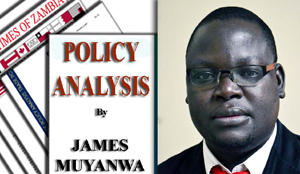 AS we conclude this four-article series on the Economic Partnership Agreements (EPAs), it is hoped that justice has been done to the topic.
AS we conclude this four-article series on the Economic Partnership Agreements (EPAs), it is hoped that justice has been done to the topic.
One expects that the articles have helped to throw some light on this otherwise perennial but thorny subject.
In the first article , I indicated that the EPA arrangement is an initiative between the European Union (EU) on one hand and the African Caribbean and Pacific (ACP) countries – to which Zambia is a founding member – on the other.
According to the EU, the EPAs are trade and development agreements negotiated between the EU and ACP regions engaged in a regional
economic integration process.
On May 27 I stated that Zambia and other African countries are seemingly finding it difficult to sign the EPAs before fully industrialising their economies.
I noted that as late as April this year the country was taking the negotiations for the EPAs cautiously to ensure a famous “win-win situation” with the EU community.
The same week while covering the ACP conference in Brussels, Belgium, Deputy Commerce, Trade and Industry minister Miles Sampa told me in an
interview that the Zambian Government will not blindly follow other ACP countries into signing the EPAs.
He said the government had to first quantify the possible benefits from the agreements for the Zambians and Zambian companies.
For now, I do not see a lot of benefits from the arrangement for as long as the country does not invest more in revitalising the manufacturing sector.
With the current situation where Zambia is a net import of most of the goods, fully opening up the market to the EU would turn this country into a dumping ground, if it is not already one!
The dilemma, however, is, for how long is the country going to wait for it to ensure it is able to add value to most of its raw materials
before signing the EPAs, for instance?
Last week I gave an update on the EPAs’ state of play in which I indicated which RECs had already signed the agreements and at what
levels the negotiations were for the others.
I further promised to – this week – look at some of the issues derailing the negotiations and those affecting the regions which may
have already signed the EPAs.
Primarily, the EU negotiates with Regional Economic Communities (RECs) instead of the entire ACP or individual countries.
That in itself poses a challenge of ensuring consensus among the REC member countries before any progress could be recorded.
The disparities in the economic factors for the REC member countries could account for the delays in the negotiations, because each country
could have been negotiating to address its own unique economic situation.
According to the resolutions of the 100th session of the ACP Council of ministers held in December last year, on EPAs the delegates noted
the amendment of the European Commission Regulation contrary to the spirit of the ACP-EU partnership.
This resulted in the withdrawing of some ACP member countries from market access benefits effective October 1 2014.
That had put undue pressure on ACP states to give concessions that led to the conclusion of negotiations in some regions.
For instance, negotiating meetings had not been convened with Central African and the Pacific regions for some time due to the arbitrary
conditions by the EU. For the Pacific region, there has been disagreement with the EU on fisheries, more so since fish is the region’s economic mainstay.
Generally, other specific details which could account for the delays include the areas of definition of substantially all trade, and time
frames for the liberalisation of the market.
Additionally, there are thorny issues on the rule of origin, export taxes and domestic as well as export subsidies.
Others are lack of value addition for the resources, quantity restrictions, relations with countries that are in a customs union with the EU, development of benchmarks and the target for the monitoring of the agreements.
For the East and Southern African (ESA) region, to which Zambia belongs, one of the issues has been the EU’s refusal to accept the concept of variable geometry for the region.
Coincidentally, the issue will be discussed further by the ESA ministerial consultative meeting, which is expected to be organised on the sidelines of the on-going tripartite conference in Egypt this week.
The Common Market for East and Southern Africa, the Southern African Development Community and the East African Community tripartite summit
started on Monday this week.
For comments call: 0977 246099, 0955 431442 or e-mail: jmuyanwa@gmail.com






